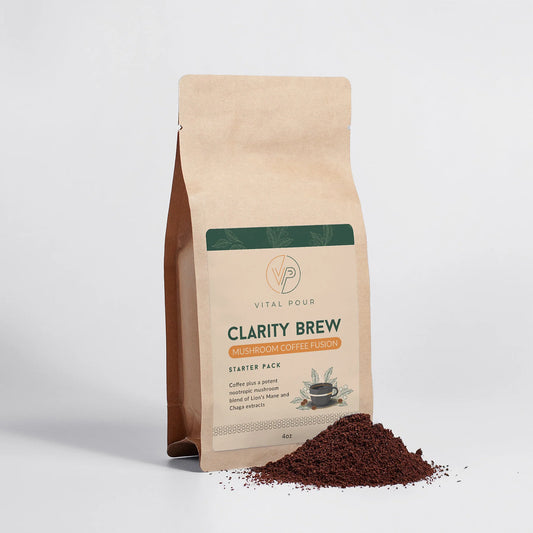The liver is one of the most important organs in the body, responsible for detoxifying harmful substances, metabolizing nutrients, and producing vital proteins. Maintaining liver health is crucial for overall well-being. Recent studies have highlighted the potential benefits of medicinal mushrooms in supporting liver health. Among these, mushroom coffee has gained popularity as a convenient way to incorporate these benefits into daily life. In addition to mushroom coffee, other natural alternatives also offer promising benefits for liver health.
Understanding Liver Health
The liver performs several vital functions essential for maintaining overall health. These functions include:
- Detoxification: The liver filters out toxins and waste products from the blood.
- Metabolism: It metabolizes carbohydrates, fats, and proteins, converting them into energy and essential molecules.
- Protein Synthesis: The liver produces proteins necessary for blood clotting and other critical functions.
- Storage: It stores vitamins, minerals, and glycogen for energy.
Common liver diseases and conditions that can affect these functions include:
- Fatty Liver Disease: Characterized by the accumulation of fat in liver cells.
- Cirrhosis: Chronic liver damage leading to scarring and liver failure.
- Hepatitis: Inflammation of the liver, often caused by viral infections.
Maintaining liver health is essential to prevent these conditions and ensure the liver continues to function properly. This can be achieved through a balanced diet, regular exercise, avoiding excessive alcohol consumption, and incorporating liver-supportive foods and supplements, such as medicinal mushrooms.
Medicinal Mushrooms for Liver Health
Overview of Medicinal Mushrooms and Their Benefits
Medicinal mushrooms have been used for centuries in traditional medicine for their numerous health benefits. They contain bioactive compounds that have been shown to support liver health by reducing inflammation, providing antioxidant effects, and improving overall liver function. Incorporating medicinal mushrooms into your diet, such as through mushroom coffee, can offer a convenient way to benefit from these powerful natural remedies.
Key Bioactive Compounds in Mushrooms that Support Liver Health
Medicinal mushrooms are rich in various bioactive compounds that contribute to their health benefits. These include triterpenoids, polysaccharides, beta-glucans, and other unique compounds that have hepatoprotective, anti-inflammatory, and antioxidant properties. Here, we explore some of the most beneficial mushrooms for liver health and their key compounds.
A. Reishi (Ganoderma lucidum)
Historical Use in Traditional Medicine
Reishi mushrooms have a long history of use in traditional Chinese medicine, often referred to as the "mushroom of immortality" due to their numerous health benefits.
Bioactive Compounds: Triterpenoids and Polysaccharides
Reishi mushrooms contain triterpenoids and polysaccharides, which are known for their anti-inflammatory and antioxidant effects.
Studies on Hepatoprotective Effects
Research indicates that Reishi mushrooms have hepatoprotective properties, helping to protect liver cells from damage. Studies from sources such as the World Mushroom Society and Mushroom Maestro have shown that Reishi can reduce liver inflammation and oxidative stress.
Benefits: Reducing Inflammation, Antioxidant Effects, Improving Liver Function
Reishi mushrooms can help reduce inflammation, provide antioxidant protection, and improve overall liver function. These benefits have been documented in journals like the Journal of Plant Medicines and Natures Rise.
B. Cordyceps (Cordyceps sinensis)
Traditional Use in Chinese and Tibetan Medicine
Cordyceps has been used traditionally in Chinese and Tibetan medicine for its rejuvenating and health-promoting properties.
Key Compounds: Cordycepin, Polysaccharides
Cordyceps contains cordycepin and polysaccharides, which are beneficial for liver health.
Research on Liver Protection and Disease Prevention
Studies highlighted by Mushroom Maestro and the World Mushroom Society suggest that Cordyceps can enhance liver enzyme activity, reduce fibrosis, and provide antioxidant benefits.
Benefits: Enhancing Liver Enzyme Activity, Reducing Fibrosis, Antioxidant Properties
Cordyceps mushrooms have been found to enhance liver enzyme activity, reduce liver fibrosis, and offer powerful antioxidant properties, as documented in the Journal of Plant Medicines and Natures Rise.
C. Lion’s Mane (Hericium erinaceus)
Historical Use and Traditional Benefits
Lion’s Mane mushrooms have been used in traditional medicine for their neuroprotective and health-boosting properties.
Bioactive Compounds: Hericenones and Erinacines
Lion’s Mane contains hericenones and erinacines, compounds known for their health benefits.
Studies on Liver Protection, Reducing ALT and AST Levels
Research indicates that Lion’s Mane can help protect the liver and reduce levels of ALT and AST, enzymes that indicate liver damage, as reported by the World Mushroom Society and Natures Rise.
Benefits: Preventing Alcohol-Induced Liver Damage, Reducing Fibrosis
Lion’s Mane mushrooms are beneficial for preventing alcohol-induced liver damage and reducing liver fibrosis, supported by studies in the Journal of Plant Medicines and Natures Rise.
D. Chaga (Inonotus obliquus)
Use in Traditional Medicine
Chaga mushrooms have been used in traditional medicine for their health-promoting properties.
Key Compounds: Polysaccharides, Betulinic Acid
Chaga contains polysaccharides and betulinic acid, known for their antioxidant and hepatoprotective properties.
Research on Antioxidant and Hepatoprotective Properties
Studies from the World Mushroom Society show that Chaga can prevent oxidative liver damage and support liver function.
Benefits: Preventing Oxidative Liver Damage, Supporting Liver Function
Chaga mushrooms help prevent oxidative liver damage and support overall liver function, as documented by Natures Rise and Mushroom Maestro.
E. Turkey Tail (Trametes versicolor)
Traditional Use and Medicinal Benefits
Turkey Tail mushrooms have been used traditionally for their immune-boosting and health-promoting benefits.
Bioactive Compounds: Polysaccharopeptides (PSP) and Polysaccharide-K (PSK)
Turkey Tail contains PSP and PSK, compounds with powerful health benefits.
Studies on Liver Health: Reducing Oxidative Stress, Preventing Liver Tissue Damage
Research indicates that Turkey Tail mushrooms can reduce oxidative stress and prevent liver tissue damage, as reported by the World Mushroom Society and Mushroom Maestro.
Benefits: Reducing Oxidative Stress, Preventing Liver Tissue Damage
Turkey Tail mushrooms help reduce oxidative stress and prevent liver tissue damage, supported by studies in journals like the Journal of Plant Medicines and Natures Rise.
F. Maitake (Grifola frondosa)
Historical Use in Traditional Medicine
Maitake mushrooms have been used in traditional medicine for their health-boosting properties.
Key Compounds: Beta-Glucans
Maitake contains beta-glucans, compounds known for their immune-supporting and liver-protecting properties.
Research on Liver Protection and Immune Support
Studies highlighted by Mushroom Maestro show that Maitake mushrooms can protect the liver and support immune function.
Benefits: Antioxidant and Anti-Inflammatory Properties, Supporting Liver Cell Health
Maitake mushrooms offer antioxidant and anti-inflammatory properties, supporting overall liver cell health, as documented by the World Mushroom Society.
Mushroom Coffee and Liver Health
Overview of Mushroom Coffee
Mushroom coffee is a unique blend that combines traditional coffee with powdered medicinal mushrooms, offering a variety of health benefits without sacrificing the familiar taste of coffee. Popular brands often use mushrooms like Reishi, Cordyceps, Lion’s Mane, and Chaga, known for their therapeutic properties.
Benefits of Consuming Mushroom Coffee for Liver Health
Mushroom coffee can significantly benefit liver health due to the bioactive compounds found in its key ingredients. These compounds help reduce inflammation, provide antioxidant protection, and enhance liver function, making mushroom coffee an excellent addition to a liver-supportive diet.
Key Ingredients: Reishi, Cordyceps, Lion’s Mane, Chaga
- Reishi: Known for its hepatoprotective effects, Reishi helps reduce liver inflammation and oxidative stress.
- Cordyceps: Enhances liver enzyme activity and reduces fibrosis, supporting overall liver health.
- Lion’s Mane: Protects the liver by reducing ALT and AST levels, preventing alcohol-induced liver damage.
- Chaga: Offers antioxidant properties that prevent oxidative liver damage and support liver function.
How Mushroom Coffee Supports Liver Detoxification and Overall Function
Mushroom coffee supports liver detoxification by providing bioactive compounds that help the liver filter out toxins and waste products more effectively. The anti-inflammatory and antioxidant properties of mushrooms also aid in protecting liver cells from damage, improving overall liver function.
Comparison with Traditional Coffee and Its Effects on the Liver
Traditional coffee, when consumed in moderation, has been shown to offer some liver health benefits, such as reducing the risk of liver cancer and fibrosis. However, excessive coffee consumption can lead to increased liver enzyme levels and potential liver damage. Mushroom coffee provides similar liver benefits while minimizing the potential downsides of traditional coffee, thanks to its additional medicinal properties from mushrooms.
Other Alternatives for Liver Health
Dietary Changes: Incorporating More Medicinal Mushrooms into Meals
Incorporating medicinal mushrooms into your diet can be an effective way to support liver health. These mushrooms can be added to various meals, offering both culinary and health benefits.
Recipes and Meal Ideas Featuring Liver-Friendly Mushrooms
- Mushroom Burgers: A delicious and liver-friendly alternative to traditional burgers, using a blend of medicinal mushrooms.
- Mushroom Soup: A comforting and nutritious soup featuring a variety of liver-supportive mushrooms.
Supplements: Considerations and Recommendations for Mushroom Supplements
For those who prefer not to incorporate mushrooms into their meals, mushroom supplements are a convenient alternative. It's important to choose high-quality supplements that contain a standardized amount of active compounds to ensure maximum benefits.
Importance of Sourcing High-Quality Mushroom Products
When selecting mushroom products, whether for coffee, meals, or supplements, it's crucial to choose those that are sourced from reputable suppliers. High-quality mushroom products are more likely to contain the necessary bioactive compounds that provide liver health benefits. Look for products that are organically grown and have been tested for purity and potency.
Precautions and Considerations
Potential Side Effects of Medicinal Mushrooms
While medicinal mushrooms are generally considered safe, they can cause side effects in some individuals. Common side effects may include:
- Digestive issues: Some people might experience stomach discomfort, nausea, or diarrhea.
- Allergic reactions: Skin rashes, itching, or respiratory issues could occur in rare cases.
- Blood sugar and blood pressure changes: Certain mushrooms may affect blood sugar levels or blood pressure, which is important for people with diabetes or hypertension to consider.
Importance of Consulting Healthcare Professionals Before Starting Any New Supplement
Before incorporating medicinal mushrooms or mushroom coffee into your diet, it's crucial to consult with a healthcare professional, especially if you:
- Are pregnant or breastfeeding.
- Have existing health conditions such as diabetes, hypertension, or autoimmune disorders.
- Are taking medications that might interact with mushrooms (e.g., blood thinners, immune suppressants).
Ensuring the Source of Mushrooms is Reliable to Avoid Contaminants and Toxins
To maximize benefits and minimize risks, ensure that the mushroom products you use are sourced from reputable suppliers. This helps avoid contaminants such as heavy metals, pesticides, and toxins. Look for products that are:
- Organically grown.
- Tested for purity and potency by third-party laboratories.
- Certified by health and safety standards organizations.
Lifestyle Factors for Optimal Liver Health
Importance of a Balanced Diet Rich in Fruits, Vegetables, Lean Proteins, and Whole Grains
A balanced diet supports liver health by providing essential nutrients and reducing the workload on the liver. Key dietary components include:
- Fruits and Vegetables: Rich in antioxidants and fiber, they help reduce inflammation and support detoxification.
- Lean Proteins: Aid in liver cell repair and regeneration.
- Whole Grains: Provide fiber and essential nutrients that help maintain liver function.
Regular Exercise and Its Role in Maintaining Liver Health
Regular physical activity helps in:
- Reducing liver fat.
- Improving insulin sensitivity.
- Enhancing overall metabolic health, which in turn supports liver function.
Moderation in Alcohol Consumption and Avoiding Smoking
Excessive alcohol and smoking can lead to severe liver damage. To protect liver health:
- Limit alcohol intake to recommended levels (up to one drink per day for women and up to two drinks per day for men).
- Avoid smoking and exposure to secondhand smoke.
Regular Health Check-Ups and Liver Function Tests for Early Detection of Liver Issues
Routine check-ups and liver function tests can help in early detection and management of liver conditions. This includes:
- Blood tests to measure liver enzyme levels.
- Imaging tests such as ultrasound or MRI.
- Regular consultations with healthcare providers.
Vaccinations for Liver Diseases Like Hepatitis A and B
Vaccinations are an effective preventive measure against certain liver diseases:
- Hepatitis A and B Vaccines: Protect against viral infections that can cause liver inflammation and damage.
- Regular Screening: For those at high risk of hepatitis infections or liver diseases.
Conclusion
Recap of the Benefits of Medicinal Mushrooms for Liver Health
Medicinal mushrooms such as Reishi, Cordyceps, Lion’s Mane, Chaga, Turkey Tail, and Maitake offer a range of benefits for liver health. These mushrooms contain bioactive compounds like polysaccharides, triterpenoids, and antioxidants, which help in reducing inflammation, preventing oxidative damage, enhancing liver enzyme activity, and improving overall liver function.
Encouragement to Incorporate Mushroom Coffee and Other Liver-Supportive Practices
Incorporating mushroom coffee into your daily routine is an easy and enjoyable way to support liver health. Alongside mushroom coffee, adopting other liver-supportive practices such as a balanced diet, regular exercise, moderate alcohol consumption, and regular health check-ups can significantly enhance liver function and overall well-being.
Final Thoughts on Maintaining a Holistic Approach to Liver Health
Maintaining liver health requires a holistic approach that includes dietary choices, lifestyle habits, and regular medical consultations. By integrating medicinal mushrooms and other healthy practices into your routine, you can promote liver health and prevent potential liver diseases.
FAQs About Mushrooms and Liver Health
What Mushroom is Best for Fatty Liver?
Reishi and Cordyceps are particularly beneficial for fatty liver disease. Reishi helps reduce liver inflammation and oxidative stress, while Cordyceps enhances liver enzyme activity and reduces fibrosis, supporting overall liver health.
Are There Any Risks Associated with Consuming Medicinal Mushrooms?
While medicinal mushrooms are generally safe, some people may experience side effects such as digestive issues, allergic reactions, or changes in blood sugar and blood pressure levels. It's important to consult with a healthcare professional before starting any new supplement, especially if you have existing health conditions or are taking medications.
How Do Mushrooms Support Detoxification in the Body?
Medicinal mushrooms support detoxification by providing bioactive compounds that enhance the liver's ability to filter out toxins and waste products. Their anti-inflammatory and antioxidant properties also help protect liver cells from damage, improving overall detoxification processes.
Can Mushrooms Help with Other Aspects of Liver Health Besides Detoxification?
Yes, medicinal mushrooms offer a range of benefits beyond detoxification. They help reduce inflammation, prevent oxidative damage, enhance liver enzyme activity, and improve liver function, making them valuable for overall liver health.
How Should One Incorporate Medicinal Mushrooms into Their Daily Routine?
Medicinal mushrooms can be incorporated into your daily routine through mushroom coffee, supplements, and dietary additions. Start by adding mushroom coffee to your morning routine, using high-quality mushroom supplements, or including medicinal mushrooms in your meals through recipes like mushroom burgers or soups. Always ensure you source mushrooms from reputable suppliers to maximize their health benefits.


